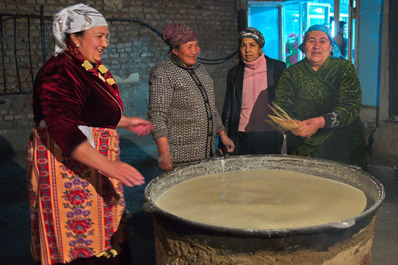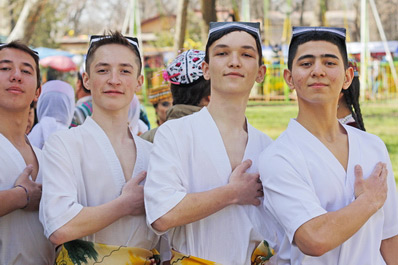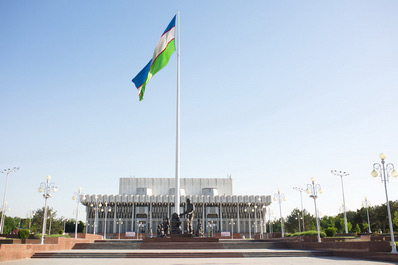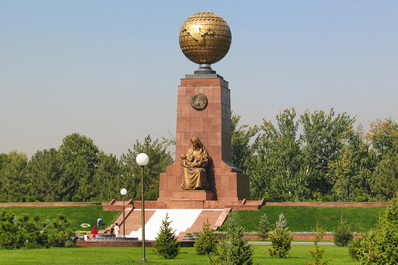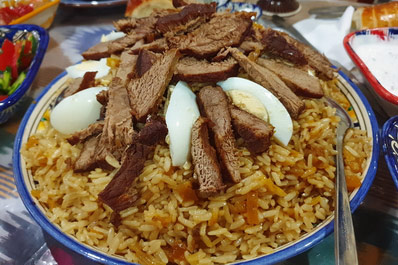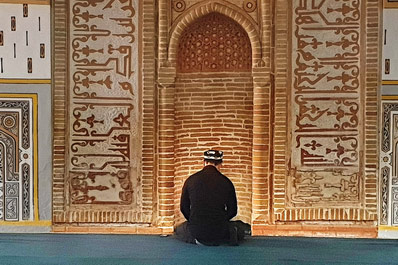Holidays in Uzbekistan
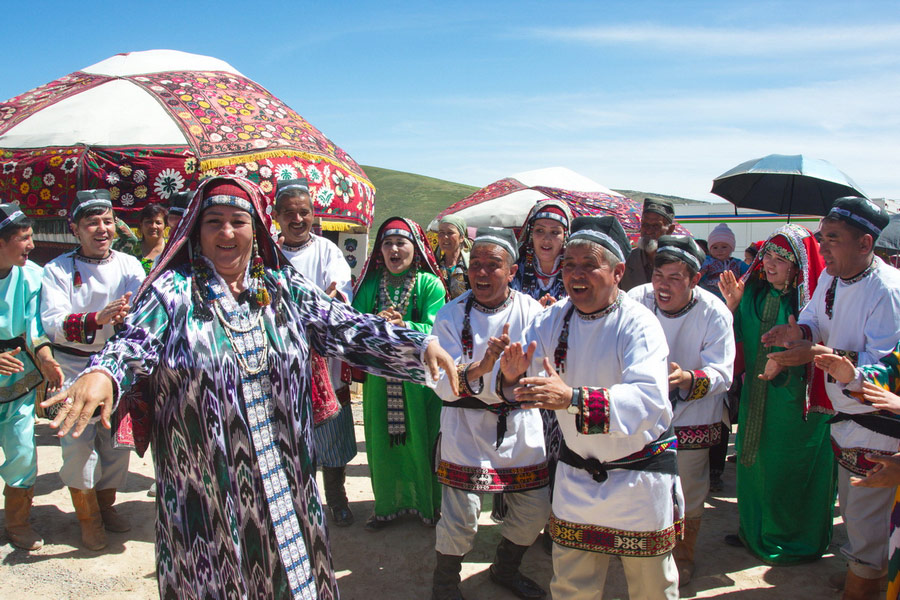
Uzbekistan is known for its love of holidays and celebrates them with great enthusiasm. On any holiday, whether it is national, religious, or secular, it is traditional to set a rich dastarkhan (feast table) and share food with loved ones, neighbors, and even strangers. Most holidays feature folk festivals filled with songs, dances, folk games, and sports competitions. Uzbekistan has many holidays, and we invite you to learn about the most important ones—on these days, the country's leadership usually declares a public holiday.
January 1 - New Year
New Year is one of the most beloved holidays in Uzbekistan, celebrated by the majority of the population regardless of nationality or religious beliefs. It is customary to decorate the main streets and city squares with festive ornaments. A Christmas tree is typically set up in the center of each settlement, around which folk festivities are organized. On the night of December 31 to January 1, city authorities launch festive fireworks.
During New Year celebrations, children can participate in various activities with Santa Claus, the Snow Maiden, and other fairy tale characters. Many theaters and circuses offer special New Year programs that attract hundreds of spectators. Uzbeks traditionally celebrate New Year's Eve with their families at a festive table. In the final minutes of the old year, most people turn on TV to watch the President of Uzbekistan's New Year's address.
March 8 - International Women's Day
March 8 is widely regarded in Uzbekistan as the main holiday for women. Various sales promotions are announced in stores, and men buy gifts and flowers in large quantities. It is customary in Uzbekistan to congratulate not only the women in one's family but also female colleagues and teachers. Moreover, various government services give flowers to all women; for example, traffic patrol officers present flowers to female drivers.
Festive concerts are held everywhere on March 8, from kindergartens and schools to large city concert halls. The President of Uzbekistan also addresses women and congratulates them during a traditional festive event. On this day, he signs decrees awarding orders, medals, and state prizes, as well as conferring honorary titles to women from various professions who have contributed to Uzbekistan's development.
March 21 - Navruz
Navruz is one of the most cherished holidays in Uzbekistan and is even considered a national holiday. Celebrated since ancient times, Navruz takes place on the day of the vernal equinox when nature awakens. It is traditional to set rich tables in homes and on the streets. The main festive dish of Navruz, sumalyak, is usually prepared by the entire makhalla (neighborhood). This dish made from sprouted wheat is cooked for almost a day in large cauldrons and requires continuous stirring. While stirring, people often make wishes. That’s why children and people from various other backgrounds like to participate in this unique preparation.
Navruz is also a time to forget old grievances and make peace with people, even after serious disputes. On this holiday, people share festive dishes with one another and extend hospitality to neighbors who may not celebrate Navruz, as well as help those in need. Uzbek cities host folk festivals featuring songs, dances, traditional games, book fairs, and street food. Several concert venues are set up in each city, where famous Uzbek artists perform national songs and dances, and tightrope walkers put on shows. Since 2021, by presidential decree, Uzbekistan celebrates Navruz with at least three days off.
May 9 - Day of Remembrance and Honors
May 9 is a day that unites all Uzbeks. Almost every family has been affected by World War II—some had grandfathers and great-grandfathers who fought, others had grandmothers and great-grandmothers who supported the war effort from home, while some older relatives remember growing up during those difficult years. Many Uzbek families took in refugees, adopted orphans, and contributed in various ways to fighting the invaders. Over 1.5 million Uzbeks participated in the war, and nearly a third of them lost their lives. On this day, people visit war monuments, the Eternal Flame, and mass graves to lay flowers and observe a minute of silence in honor of the departed. Often, residents start singing war songs at these places, and others join in. Seeing a war veteran on this day is a special joy, though there are very few left in Uzbekistan. The celebrations include thematic exhibitions and end with a festive fireworks display.
September 1 - Independence Day
Independence Day is Uzbekistan's main national holiday, marking the country's birthday. Uzbekistan's independence was proclaimed on August 31, 1991, with the first celebrations held the next day in Tashkent. Since 1992, Independence Day has been a public holiday with large-scale celebrations. Thousands of people participate each year, including renowned artists, orchestras, military bands, children's groups, and more. Parks across the country host folk festivities, and it is customary to set up festive dastarkhans outdoors. Tashkent's main square, Mustakillik Maidoni (Independence Square), houses several important state buildings and monuments, including the Independence Monument, the Monument to the Grieving Mother, and the Walk of Fame honoring those who died in World War II.
October 1 - Teacher and Mentor Day
Celebrated since 1997, Teacher and Mentor Day honors educators in Uzbekistan. The term "teacher" is not limited to school and university instructors but also includes craftsmen who pass on their skills, such as ceramists, painters, blacksmiths, tailors, and other artisans. These mentors are often respectfully called "usto" and are honored similarly to parents.
On this day, people congratulate their teachers and mentors, give them flowers, and express gratitude. Festive events are held throughout Uzbekistan, organized at both local and state levels. The President of Uzbekistan also awards orders, medals, and honorary titles to educators and coaches from various regions.
December 8 - Constitution Day
Constitution Day is one of the main holidays in sovereign Uzbekistan. The Constitution was adopted on December 8, 1992, and became the foundational law of the Republic of Uzbekistan. As part of the Constitution Day celebrations, the President usually signs decrees pardoning several hundred convicts who have shown signs of rehabilitation.
The streets are adorned with national flags, and festive concerts and theatrical performances are held everywhere, from major urban areas to small towns. The celebrations also include sports competitions, exhibitions, educational events, and charity activities.
First Day of Ramadan Khait (Eid-al-Fitr)
The date of Ramadan Khait, also known as Eid-al-Fitr, varies as it follows the lunar calendar. This holiday begins after the holy month of Ramadan, during which Muslims fast from sunrise to sunset. The fast is obligatory for all Muslims except for those who are seriously ill, pregnant, traveling, children or elderly. The month of Ramadan encourages kindness, charity, and generosity, and it is customary to give to the poor and reconcile with relatives.
The day before Ramadan Hayit, families prepare the best dishes, such as pilaf, and share them with neighbors, including those of other religions. The holiday starts with a morning prayer (id-namaz) at the mosque, after which fasting ends. On this day, families set rich dastarkhans, visit elder relatives with gifts, and visit the graves of deceased family members.
First Day of Eid-al-Adha (Eid-ul-Adha)
Eid-al-Adha, also known as Eid-ul-Adha, coincides with the last day of Hajj, the Muslim pilgrimage to Mecca. The date is also determined by the lunar calendar, occurring 70 days after Ramadan Khait.
It is customary to perform a sacrifice on this day, usually after the festive dawn prayer. Animals like cows, sheep, goats, camels, and buffaloes can be sacrificed, but in Uzbekistan, a ram is the most common choice. The meat is often shared with the mosque and distributed to the needy, who may be acquaintances or strangers. The day before the holiday (arafah), people prepare pilaf and traditional pastries to share with neighbors.


